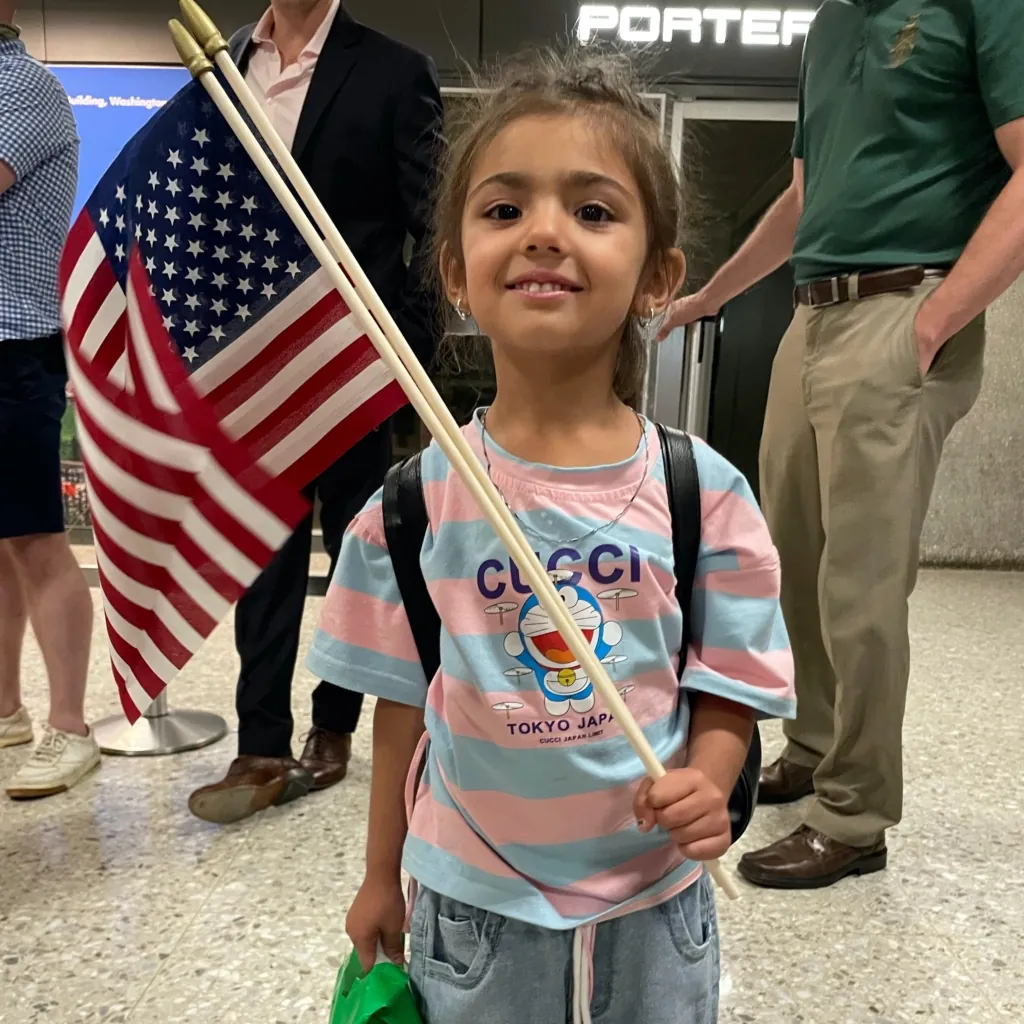
No One Left Behind helped evacuate this family from Afghanistan following the chaotic U.S. withdrawal from the country. (Courtesy photo)
Late last August, Jeff Phaneuf’s phone started ringing and it didn’t stop for seven or eight days.
As the budding entrepreneur prepared for a move across the country to attend Stanford Graduate School of Business, his marine friends from the Infantry Officer Corps were trying to manage an increasingly desperate crowd outside of Abbey Gate as the date of the U.S. evacuation from Afghanistan approached. The crowd grew as the Taliban advanced, begging the Americans to save them, to let them into the Kabul airport and onto a plane.
Phaneuf’s friend called to tell him that the situation at the gate was much worse than what people were hearing back home. Hundreds of times a day, the marines were forced to make life and death decisions on who got in and who didn’t, often based on lost or destroyed documentation as the population fled.

Jeff Phaneuf
Then his phone rang again. This time it was a Marine asking Phaneuf to verify some information so he could let people through. As word spread that Phaneuf had a direct line to the commanders at the gate, people started calling and relaying messages from their own Afghan interpreters or intelligence assets. It was like a high-stakes game of telephone: An Afgani interpreter calls or texts the American marine he stood alongside in the War on Terror. The American calls Phaneuf desperate to help. Phaneuf calls his contacts at the gate, passing on whatever is needed to locate them in the crowd. And on and on. In one instance, Phaneuf helped direct marines to 32 Afghan female athletes, as detailed in this New York Times article.
“For that last week of August, I found myself in a unique position that I would never wish for again: I was one of the sole conduits to getting people through the gate. I got calls from colonels at the Pentagon, from people at the State Department and in the administration, asking me – a guy just about to start business school, a Marine Corps vet, but otherwise just just a grad student – to help get their people through,” Phaneuf tells Poets&Quants.
“I realized what a catastrophic failure it had been, that allowed a situation where this ragtag group of veterans and volunteer organizations to make life and death decisions for other people. My friends were there when the suicide bomb went off at the gate. A friend of mine lost nine Marines, another had a marine severely wounded. I just felt very, very, deeply connected.”
NO ONE LEFT BEHIND
When Stanford classes started a month later, the U.S. operation had ended and the Americans withdrew. But Phaneuf still had so many Afghani interpreters and others on the list that he hadn’t been able to help. He’d be sitting in accounting class or at Stanford’s infamous beer pong league, and he’d get a call or text from someone pleading for help in saving somebody’s life.
Phaneuf took a leave of absence from Stanford to work with No One Left Behind, the leading non-profit that works to keep America’s promise to Iraqi and Afghani interpreters and others who aided in the War on Terror. He is one of six MBAs working to professionalize and scale the nonprofit at lightning speed after the publicity of the Afghanistan evacuation.

A girl No One Left Behind helped evacuate from Afghanistan. (Courtesy photo)
NOLB has evacuated more than 1,500 Afghanis in the last year and are preparing flights in the next month to evacuate another 500. They’ve also resettled nearly 1,000 families in the same time frame, spending between $7 and $8 million on their mission.
“What we really had to do is build a business. When the evacuation started last summer, we basically had no full time employees. and raised $300,000 in annual revenue through donations. We had very few professionalized business processes or governance,” says Philip Caruso, NOLB board chairman and acting executive director, who earned his MBA/JD from Harvard University in 2019.
“Over the last year, we’ve worked very diligently to professionalize the organization and scale it. We went from $300,000 in revenue to $18 million, which was fueled in part by the news and people wanting to donate, but it’s also a function of just how strong the team is, the quality of the folks and the business expertise that we have.”
APPLYING BUSINESS TRAINING TO A MILITARY-LIKE OPERATION
Today, five of the 13 NOLB board members have MBAs from a variety of schools: Columbia, Harvard, Saïd, and Duke. Phaneuf, working as a full-time staff member, plans to finish his Stanford MBA in 2024.

Philip Caruso, chairman of No One Left Behind
All of them are military veterans, and many of them worked with interpreters or other assets that NOLB is working to help.
While aspects of the NOLB mission resemble the objectives of a military operation, they also require the strategy and long-term planning of a classic business problem. The training and real-world experience of the MBAs have helped to professionalize the non-profit organization.
“I would say, just on the MBA side, a lot of veterans from a lot of business schools have worked with interpreters who are the primary beneficiaries of this program. Keeping our country’s moral obligation to them – as well as the pragmatic impacts it has on American foreign policy – I think is one of the defining issues for our generation of veterans,” Caruso tells P&Q.
We spoke with each of NOLB’s MBAs to find out why the mission is so important to them and how their business school training prepared them for the challenge at hand. Excerpts from our conversations are presented below.
NEXT PAGE: Philip Caruso, MBA/JD ’19, Harvard University, NOLB board chairman
and acting executive director











Questions about this article? Email us or leave a comment below.